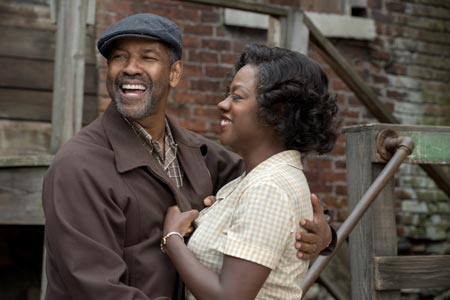Film (2016)
Directed by Denzel Washington
Screenplay by August Wilson
Based on his play Fences
With Denzel Washington (Troy Maxson), Viola Davis (Rose Maxson), Stephen Henderson (Jim Bono), Jovan Adepo (Cory), Russell Hornsby (Lyons), Mykelti Williamson (Gabriel), Saniyya Sidney (Raynell)

Viola Davis as Rose
in “Fences”
©2016 Paramount Pictures. All Right Reserved.
Troy and Rose Maxson live in a small house. He has a son by a previous connection, Lyons (Russell Hornsby), and they have a son, Cory (Jovan Adepo) together. Troy’s brother, Gabriel (Mykelti Williamson), is developmentally or psychologically disabled, and frequents the scene though living elsewhere. Troy’s work friend, Jim Bono (Stephen Henderson), serves as a constant companion and sounding board.
At first, Troy, a former potential baseball player who did not make it in the major leagues, seems like a loving, amusing, vital husband. Though he is a tough father, one takes it in as a kind of disciplined love. Troy drinks a bit too much, but it seems to be a weekend release.
However, as things unwind, it turns out that Troy has unwound himself. Things get much more complex with his wife and with his sons, particularly with Cory, the younger one, as his irresponsibilities and intransigence begin to fence him off from everyone he loves.
There is a tremendous amount of good writing and acting here, and Denzel Washington has, for much of this long film, provided very good direction. The script, however, gets out of control. In the last half hour it drags on when it might easily end at any point. It’s unclear whether the screenplay, which is by the late August Wilson, was ever finally edited by him, but it seems that the director and film editors have erred on the side of inclusion. That feels generally like a mistake.
Much of the lead-in during the first forty-five minutes feels like business as usual – depicting a kind of easygoing relationship between Troy and his friend, Jim, and a loving and joking relationship between Troy and Rose. That goes on for such a long time, one wonders whether the entire drama will be a kind of slice of life depiction.
That turns out not to be as the midpoint of the film is reached and the major plot point is revealed. Sure enough that focuses the drama signficiantly, gives Viola Davis a whole new dinension of opoortunities for acting, and spells a signficant turn in Washington’s portrayal of Troy. All of that is dramatic when it comes, but what follows is far too drawn out and dosed with a kind of sentimentality that the preceding part of the film does not welcome.
Part of what makes this drama signficant is its very lack of sentiment early on, and it’s what explains, to a considerable extent, Troy’s harsh responses to his sons. So for that tone to be completely reversed near the end feels weirdly inconsistent.
Washington’s acting, particularly in the first half, is stunning. He truly embodies the role of this complex protagonist and does it with gusto. He is unbridled in all sorts of ways – passionately, with his wife, touchingly with his disabled brother, and unsettlingly harsh with his sons. But Washington gives it a reading which makes good coherent sense.
The script, and Washington’s role as Troy, as a result, take something of a hit in the second half. It’s not just the turn of events that causes this, it’s the way in which the script has Troy argue his case that doesn’t come across as compellingly.
Correspondingly, Davis has a more supporting role in the first half, and though she does it warmly and exuberantly, it’s not terribly complex. All of that changes in the second half, when she is put to the test. Her explosion of emotion at that point is vivid and heartrending and she does a compelling job of conveying the immensely complex situation into which she is forced.
These two performances alone are well worth the price of admission, if one takes the relative unwieldiness of the entire script with a grain of salt. It’s a great story and there is much good writing that careful editing might have transformed into a tauter whole. As it is, this is a tough, vivid and heartbreaking account of tragic complications in an African-American family in mid-twentieth century urban America.
– BADMan
Leave a Reply